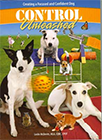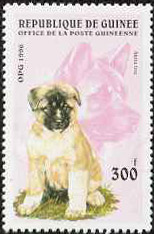
Control Unleashed: The Puppy Program
Control Unleashed: The Puppy Program is geared to people raising pups, especially those with whom they want to do dog sports. It’s also extremely useful for people with adult dogs, rescue or otherwise, who need remedial work on little quirks that can make life difficult, especially getting distracted by exciting things happening, or getting spooked by weird things Out There. There‘s a lot of emphasis on getting dogs to pay attention to you and on teaching dogs how to cope. Though the book can be used for remedial work, as with Zulch and Mills’ ‘ Life Skills for Puppies’ (1), the focus is on preventing problems.
McDevitt tackles the problem of being tempted to push dogs too hard, because you can achieve remarkable results. Focusing just on performance, rather than on the development of the pup as a whole, isn’t in the dog’s interests, (or yours long-term). Her take on ethics reflects that of Steven Lindsay – people can forget that the why of training is important, not just how we train (2). We may try to train with rewards, and believe we’re ‘kind’ trainers, but if there’s no space left for the dog´s own needs, what we’re doing is ethically dubious. By recognizing and respecting each dog as an individual, it’s possible to build a better relationship. Pushing a dog too hard, and failing to allow a dog to be a dog, can create problems which affect performance, so taking a break can help dogs perform better in the activities we’ve chosen for them.
Building a strong relationship means getting to know the dog as an individual, listening to the dog, and adjusting training to who the dog is, rather than trying to make the dog fit an inflexible training schedule. McDevitt stresses adjusting your training schedule to the dog in front of you. She also reminds readers that it’s important to accept that not every dog is geared to the activity we want him or her to do. Sometimes we need to be more flexible, either choosing an activity better suited to that dog, or getting a dog more suited to what we want to do.
McDevitt’s approach to distractions includes recognizing that dogs need time to do doggy activities, like sniff or forage, and that it helps to integrate these activities into training, with a release word, like ‘OK’ following a recall. Releasing a dog during training lets them unwind a bit, and allows for longer training sessions than if sessions involve the dog always paying attention to the owner.
Dogs also need to learn how to cope with things they find spooky, and learning to cope helps them to stay calm under stress. One tool she uses for this is ‘mat work’, or teaching a pup or dog to use a mat as a place of safety. Giving a dog a safe place to go to is an idea that makes intuitive sense, since that’s what humans look for when we feel unnerved. It’s also recommended by Zulch and Mills in their Life Skills for Puppies.
McDevitt also recommends teaching a dog to tell you about what’s happening, rather than, say, going up and barking at something that Looks Odd, or snarfing a piece of carrion found on a walk. Distractions can be tempting, as well as spooky, so teaching ‘leave it’ involves teaching self-control. McDevitt recommends tying this with the idea of availability - ‘that isn’t available, but this is’. This idea makes intuitive sense in that parents will often remove something dangerous from a child, like an electrical cable, replacing it with something safe and equally interesting!
Dog sports people tend to focus on motivation, ways to get a dog to become especially keen on the sport the owner has chosen. Yet if dogs become too keen, too aroused, they can get bitey and generally out of control. Arousal regulation means both increasing arousal to enhance motivation, and switching to a more relaxing activity if the dog is becoming too wound up. Again, experienced parents could find parallels with raising kids – sometimes you need to find a calming activity for them, when you sense ‘this could end in tears’!
McDevitt’s approach certainly seems likely to result in a well-balanced dog, one who’s able to focus on a task the owner chooses, and pay attention to the owner in everyday life, without the neuroses and quirks that can result from being pushed to be a high-achiever with little space to develop everyday skills. Her stress on respecting the dog we’re training, and seeing that dog as an individual, is a useful reminder that our observational skills are important. We need to look at the dog’s body language as a whole, not just whether or not the dog is obeying a command. A minor drawback to this book is that not all owners can ‘read’ dogs, even if they’ve been around dogs for years. Perhaps more on interpreting canine body language would be helpful.
The big drawback of this book is that you need to read all of it for the first parts to make sense, which means reading the first parts again! There are a lot of references at the beginning to games that aren’t explained until later. If you’re looking for solutions to a particular problem, or if you want a book that tells you how to train step by step, this can be a bit frustrating. This book is easier to use than the original ‘Control Unleashed’, geared to adult dogs with behavioral issues which hamper their performance. However, it takes some patience and getting used to the way McDevitt writes.
Is reading the whole book before understanding the start worth the effort? I’d say very much so, for a number of reasons. First, McDevitt integrates training into everyday life, for example, teaching ‘stay’ whenever a dog needs to hold back, like getting out of a vehicle, or approaching a strange dog. Secondly, because her approach focuses on the relationship between dog and owner, and a relationship is a dialogue, which includes the owner listening to the dog. Thirdly, because she believes in empowering the dog, giving him, or her, the ability to cope. Lastly, her awareness that ethical issues only make sense in a wider context helps us to put training into perspective.
Review by Alison Lever, 2015
References:
1) Zulch, Helen and Daniel Mills, (2012) Life Skills for Puppies. Hubble and Hattie, Dorset
2) Lindsay, S. (2005) Applied Dog Behaviour and Training vol 3, Procedures and Protocols. Blackwell, London



